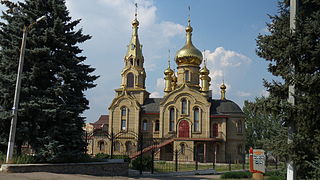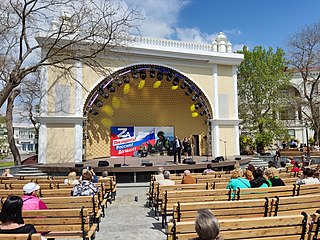
Marinka or Maryinka is an abandoned city in Pokrovsk Raion, Donetsk Oblast, eastern Ukraine. Its estimated population in 2022 was 9,089 with 2001 estimates pinning it at 10,530.
The phone call to Putin is a slang term used by some Russian police departments for torture method which consists of administering electric shocks to the person's earlobes, nose, and/or genitals. According to Amnesty International, torture with electric shocks by security forces and prison, jail, and penal colony guards is common in Russia.

The Sparta Battalion or 80th Separate Guards Reconnaissance Battalion "Sparta" named after A. S. Pavlov is a special purpose unit of the Russian Armed Forces. Until 2023, unit was part of Russian people's militia military unit of the Russian republic of Donetsk People's Republic (DPR) in eastern Ukraine. The unit has been fighting against the Armed Forces of Ukraine in the Donbas war and the 2022 Russian invasion. Formed in 2014, it was initially led by the Russian-born Arsen Pavlov until his death in October 2016, and then by Vladimir Zhoga, from Sloviansk, until his death in March 2022.

Sergey Vladimirovich Surovikin is a Russian army general who serves as head of the Coordinating Committee for Air Defence under the Council of Defence Ministers of the Commonwealth of Independent States (CIS) since September 2023.

Taiwan–Ukraine relations refer to the international relations between Taiwan and Ukraine. Bilateral relations after Ukraine's independence began in 1992.

The Wagner Group, officially known as PMC Wagner, is a Russian state-funded private military company (PMC) controlled until 2023 by Yevgeny Prigozhin, a former close ally of Russia's president Vladimir Putin. The Wagner Group has used infrastructure of the Russian Armed Forces. Evidence suggests that Wagner has been used as a proxy by the Russian government, allowing it to have plausible deniability for military operations abroad, and hiding the true casualties of Russia's foreign interventions.
Casualties in the Russo-Ukrainian War included six deaths during the 2014 annexation of Crimea by the Russian Federation, 14,200–14,400 military and civilian deaths during the War in Donbas, and up to 500,000 estimated casualties during the Russian invasion of Ukraine.

As part of the Russian invasion of Ukraine, the Russian state and state-controlled media have spread disinformation in their information war against Ukraine. Ukrainian media and politicians have also been accused of using propaganda and deception, although such efforts have been described as more limited than the Russian disinformation campaign.

Ukraine's easternmost oblasts, Donetsk, Luhansk, and Kharkiv, are the site of a theatre of operation in the ongoing Russian invasion of Ukraine.
The Russo-Ukrainian War has seen foreign volunteers participate on both sides of the conflict. Most foreign fighters joined the conflict during one of two waves. The first wave happened from 2014 to 2019 during the War in the Donbas and consisted of approximately 17,241 foreign fighters. The second wave is considered by researchers to have been much larger and began in 2022 after the Russian invasion of Ukraine.

The Freedom of Russia Legion, also called the Free Russia Legion, is a Ukrainian-based paramilitary unit of Russian citizens, which opposes the Russian regime of Vladimir Putin and its invasion of Ukraine. It was formed in March 2022 and is reportedly part of Ukraine's International Legion. It consists of defectors from the Russian Armed Forces, and other Russian volunteers, some of whom had emigrated to Ukraine. It is one of several such units participating in the Russo-Ukrainian War on behalf of Ukraine.

The town of Borodianka was bombed extensively by the Russian Armed Forces during the Russian invasion of Ukraine.

The Russian occupation of Sumy Oblast was a military occupation that began on 24 February 2022, when Russian forces invaded Ukraine and began capturing parts of the Sumy Oblast. The capital of the Oblast, Sumy, was never captured by Russian forces, however, other cites were captured including Konotop and Trostianets. On 7 April, Dmytro Zhyvytskyi, governor of Sumy Oblast, said that all Russian troops had left the region, but it was still unsafe due to rigged explosives and other ammunition Russian troops had left behind.
The torture of Russian soldiers in Mala Rohan was an incident during the 2022 Russian invasion of Ukraine that occurred in the village of Mala Rohan. As documented by the UN High Commissioner for Human Rights, members of Ukrainian armed forces shot the legs of three captured Russian soldiers and tortured Russian soldiers who were wounded. The incident is likely to have occurred on the evening of March 25, 2022 and was first reported following the publication on social media of a video of unknown authorship between March 27 and March 28. As a case of summary execution and torture of prisoners of war, the incident might qualify as a war crime.
During the build-up to its invasion of Ukraine, Russia falsely accused Ukraine of genocide against Russian speakers in the Donbas region. Ukraine fought a war against Russian proxy forces in the Donbas War from 2014 to 2022. Russia's president Vladimir Putin used this claim of genocide to justify the invasion of Ukraine. There is no evidence to support the allegation and it has been widely rejected.

The battle of Bakhmut was a major battle between the Russian Armed Forces and the Ukrainian Armed Forces for control of the city of Bakhmut, during the eastern Ukraine campaign, a theatre of the Russian invasion of Ukraine. It is regarded by military analysts to be the bloodiest battle since the end of World War II.

The battle of Soledar was a series of military engagements in and around the urban-type settlement of Soledar during the battle of Donbas in the Russian invasion of Ukraine.

The Russian occupation of Kyiv Oblast was a military occupation that began on the first day of the Russian Invasion of Ukraine on 24 February 2022. The capital, Kyiv, was extensively bombed during the invasion, but was never captured. However, many cities were captured near North and western parts of the Oblast.

The Mozart Group is a defunct private military company that operated in Ukraine during the 2022 Russian invasion of Ukraine. The Mozart Group was composed of Western volunteers with military experience and provided military training, civilian evacuations and rescue, and humanitarian aid distribution.













